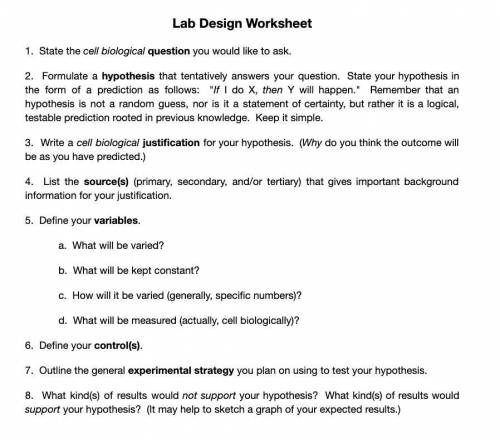
Biology, 08.12.2021 04:20 hemriccaleb5340
1. State the cell biological question you would like to ask.
2. Formulate a hypothesis that tentatively answers your question. State your hypothesis in the form of a prediction as follows: "If I do X, then Y will happen." Remember that an hypothesis is not a random guess, nor is it a statement of certainty, but rather it is a logical, testable prediction rooted in previous knowledge. Keep it simple.
3. Write a cell biological justification for your hypothesis. (Why do you think the outcome will be as you have predicted.)
4. List the source(s) (primary, secondary, and/or tertiary) that gives important background information for your justification.
5. Define your variables.
a. What will be varied?
b. What will be kept constant?
c. How will it be varied (generally, specific numbers)?
d. What will be measured (actually, cell biologically)?
6. Define your control(s).
7. Outline the general experimental strategy you plan on using to test your hypothesis.
8. What kind(s) of results would not support your hypothesis? What kind(s) of results would support your hypothesis? (It may help to sketch a graph of your expected results.)


Answers: 2


Another question on Biology

Biology, 21.06.2019 20:00
The phylogeny chart shows the evolution of camels. camelus is the modern-day camel. based on this chart, which three statements are true? ⭕ modern camels are more related to stenomylus than to eschatius. ⭕ stenomylous and modern camels do not share a common ancestor. ⭕ modern camels are more related to camelops than to aepycamelus. ⭕ pliauchenia and oxydactylus may share similar features. ⭕ procamelus and stenomylous may share similar features.
Answers: 2

Biology, 22.06.2019 02:30
What evidence supports the law of conservation of energy? a) mechanical energy is converted to chemical energy during photosynthesis. b) oxygen is made from the breakdown of carbon dioxide during photosynthesis. c)energy is absorbed by chlorophyll and becomes chemical energy during photosynthesis. d)the sun gives off light energy that is absorbed by plants.
Answers: 1

Biology, 22.06.2019 06:00
Im inn a ! what"s the answer which of the following is one way creativity can scientists? by ensuring they follow the scientific method by increasing the amount of time it takes to complete scientific experiments by making sure they only try things that have already been proven by leading them to ask more questions about the natural world
Answers: 1

Biology, 22.06.2019 13:00
Sequence how oxygen accumulated in the atmosphere and the effect it had on life by completing the flowchart
Answers: 1
You know the right answer?
1. State the cell biological question you would like to ask.
2. Formulate a hypothesis that tentat...
Questions




Spanish, 26.03.2021 01:50

History, 26.03.2021 01:50


Health, 26.03.2021 01:50

Mathematics, 26.03.2021 01:50

English, 26.03.2021 01:50

Spanish, 26.03.2021 01:50

Biology, 26.03.2021 01:50



Computers and Technology, 26.03.2021 01:50

Physics, 26.03.2021 01:50


English, 26.03.2021 01:50

Social Studies, 26.03.2021 01:50


Advanced Placement (AP), 26.03.2021 01:50



